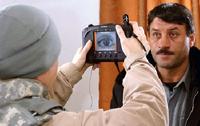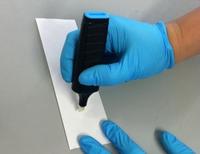-
Smart keyboard can tell who you are – and also powers and cleans itself
In a novel twist in cybersecurity, scientists have developed a self-cleaning, self-powered smart keyboard that can identify computer users by the way they type. The smart keyboard can sense typing patterns — including the pressure applied to keys and speed — that can accurately distinguish one individual user from another.
-
-
EU Parliament considers reviving uniform air-passenger information legislation
The European Parliament is considering reviving draft legislation which would force airline companies to give EU member governments a cohesive and uniform set of passenger information, following heightened security concerns in the wake of the 7 January Paris attacks. The legislation, first proposed in 2011, was rejected bu the EU Parliament in 2013.
-
-
Visa Waiver program scrutinized in wake of Paris terror attacks
Following the deadly terror attacks in Paris last week, there has been a renewed criticism of the U.S. visa waiver program which has allowed travel without visa by many. The program is now subject to second thoughts by some and questions whether, as currently constituted, it may expose the United States to unjustified risks. “The visa waiver program is the Achilles’ heel of America,” said one critic, Senator Diane Feinstein (D-California).
-
-
Washington State to offer 2-tier driver’s license system to comply with Real ID Act
State officials in Washington are looking to redesign the state’s driver’s licenses and ID cards to comply with the federal 2005 REAL IDact which requires proof of legal U.S. residency for access to federal government buildings and soon domestic air travel. At least twenty-four states and territories have yet fully to comply with the REAL ID act, but Washington is one of only nine states that have not received a compliance extension from the federal government.
-
-
Mobile biometric device expedites identity matching

The Stockton (California) Police Department (SPD) has been quietly testing a state-of-the-art Mobile Biometric Device (MBD) technology for the past four years. Designed quickly to scan fingerprints, irises, and other biological information while officers and evidence technicians are on the field, MBDs can communicate with remote fingerprint databases and confirm matches in as little as three minutes.
-
-
U.S. introduces new security measures to screen Western-passport travelers
At least 3,000 of the 15,000 foreign fighters in Syria are from Australia and Europe. DHS has introduced new screening measures for travelers from Europe, Australia, and other allied nations due to concerns about the increasing number of Islamist militants who have fought in Syria and Iraq alongside the Islamic State (ISIS) and could travel freely to the United States using their Western passports.
-
-
Most states are complying with Real ID, but a few lag behind
Forty U.S. states and some territories have adopted the Real ID Actrequirements for state driver’s licenses and identification cards, mandated by the federal government. Alaska, American Samoa, Arizona, Kentucky, Louisiana, Maine, Massachusetts, Minnesota, Montana, New York, Oklahoma, and Washington are still considered noncompliant as of October 2014. DHS announced a phased enforcement of the Real ID Act in 2013, and residents of non-complying states are already facing restrictions – such as having to present a passport or birth certificate in order to enter restricted areas in federal facilities or nuclear power plants. These restrictions will only tighten between now and January 2016.
-
-
Building a better lie detector
The Intelligence Advanced Research Projects Activity (IARPA), within the Office of the Director of National Intelligence (ODNI), announced the other day the winner of its first public challenge contest, Investigating Novel Statistical Techniques to Identify Neurophysiological Correlates of Trustworthiness (INSTINCT). The winning solution, JEDI MIND — Joint Estimation of Deception Intent via Multisource Integration of Neuropsychological Discriminators — uses a combination of innovative statistical techniques to improve predictions approximately 15 percent over the baseline analysis.
-
-
A crime-fighting “magic” marker pen picks up hidden fingerprints

A crime-fighting “magic” marker pen that can identify the hidden properties of receipts containing fingerprint deposits within a matter of seconds will be demonstrated at the Knowledge Transfer Network’s (KTN) Applications of Forensic Science Research and Development Technology Showcase 2014 event today (8 October) in London.
-
-
Nanoparticles will allow detecting previously undetectable fingermarks
A group of researchers from Switzerland has thrown light on the precise mechanisms responsible for the impressive ability of nanoparticles to detect fingermarks left at crime scenes. The researchers have provided evidence contesting the commonly accepted theory that nanoparticles are attracted to fingermarks electrostatically. The attraction, they claim, is in fact chemical and is caused by compounds on the surface of nanoparticles bonding with a complex cocktail of compounds present in fingermark residue.
-
-
Experts urge caution in relying upon eyewitness identifications in criminal cases
A new report from the National Research Council recommends best practices that law enforcement agencies and courts should follow to improve the likelihood that eyewitness identifications used in criminal cases will be accurate. Science has provided an increasingly clear picture of the inherent limits in human visual perception and memory that can lead to errors, as well as the ways unintentional cues during law enforcement processes can compromise eyewitness identifications, the report says.
-
-
Investigative genetics technology helps nab criminals
Every year, investigators collect tens of thousands of biological samples from crime scenes that may hold valuable clues to solving criminal cases. Unlocking those clues now is easier thanks to a new software solution unveiled last week by Battelle researchers who have applied advanced bioinformatics to next-generation sequencing data. ExactID analyzes biomarkers that can predict physical appearance, ancestry, clinical traits, and familial relationships among people. This information can be invaluable to forensic analyses and case work.
-
-
Japan to adopt automated airport gates equipped with facial recognition technology
More than eleven million people visited Japan last year, the highest on record, and the government is anticipating close to twenty million foreigners in 2020, the year Tokyo will host the Summer Olympics and Paralympics. Japan plans to adopt automated airport immigration gates supported by facial recognition technology, because while the number of foreign visitors continues to increase, the number of immigration officers remains limited, or even shrinks. A general concern with using facial recognition technology at immigration gates is that passports can be valid for a decade, while a person’s appearance may change within that timeframe. Another concern with the proposed system is how facial data image collected will be stored or erased.
-
-
NYC mayor de Blasio facing criticism for curbing counterterrorism programs
New York City mayor Bill de Blasio is facing backlash over his decision to curb several counterterrorism programs introduced by former mayor Michael Bloomberg. Among other things, de Blasio has restricted the NYPD’s stop-and-frisk program; approved issuing municipal IDs of standards lower than those mandated by the federal government’s RealID program; is refusing to reinstate a special surveillance program which targeted Muslim communities in New York; and has also replaced the highly regarded deputy police commissioner for intelligence.
-
-
U.S. student visa program fails to monitor participating schools: Lawmaker
The number of student visa holders in U.S. colleges grew from 110,000 in 2001 to 524,000 in 2012. Today, more than 9,000 schools in the United States participate in the student visa enrollment program. The list includes reputable universities, but it also includes trade schools such as massage and beauty schools. Senator Charles Grassley (R-Iowa) has introduced legislation to better monitor schools which attract foreign applicants. “It’s time to close the loopholes and clamp down on schools that have a poor track record with regard to foreign students,” Grassley said.
-
- All
- Regional
- Water
- Biometrics
- Borders/Immig
- Business
- Cybersecurity
- Detection
- Disasters
- Government
- Infrastructure
- International
- Public health
- Public Safety
- Communication interoperabillity
- Emergency services
- Emergency medical services
- Fire
- First response
- IEDs
- Law Enforcement
- Law Enforcement Technology
- Military technology
- Nonlethal weapons
- Nuclear weapons
- Personal protection equipment
- Police
- Notification /alert systems
- Situational awareness
- Weapons systems
- Sci-Tech
- Sector Reports
- Surveillance
- Transportation
Advertising & Marketing: advertise@newswirepubs.com
Editorial: editor@newswirepubs.com
General: info@newswirepubs.com
2010-2011 © News Wire Publications, LLC News Wire Publications, LLC
220 Old Country Road | Suite 200 | Mineola | New York | 11501
Permissions and Policies
Editorial: editor@newswirepubs.com
General: info@newswirepubs.com
2010-2011 © News Wire Publications, LLC News Wire Publications, LLC
220 Old Country Road | Suite 200 | Mineola | New York | 11501
Permissions and Policies
